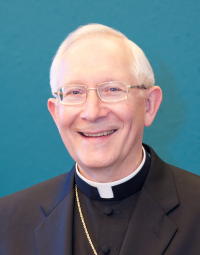
Archbishop Leonard P. Blair
“Woe to me if I do not preach the Gospel,” says St. Paul (1 Cor 9:16). You and I believe in Jesus Christ because Catholics over the last 2,000 years have not failed to hand on the Christian faith. Christ has been “preached,” as St. Paul says, and not just in words but in the “living gospel” exemplified by believers, including our own ancestors, relatives, friends and associates (and hopefully us, too), whose lives bear witness, even heroic witness, to Jesus and the truth of the Gospel.
The Christian faith has been handed on not only by individual believers, but by the very society and culture of peoples for whom the faith was part of their ethnic or national identity. Many things we take for granted in Western civilization were profoundly shaped by Judeo-Christian faith, whether it be the arts and sciences, political life and law, our calendar and customs, even our very names. You could say that traditional culture was not only evangelized, but also evangelizing.
Today in our Western world, we witness the dismantling of this older social culture, a separation of secular culture from the practice of religion and the destruction of a certain balance between the social and religious dimensions of the human person. Religion is relegated to the private sphere, and is even blamed for oppression and conflicts. Christian beliefs are no longer formative of culture, and no longer have a decisive influence on the arts and sciences, public life or moral and ethical issues. Blessed Pope Paul VI said, “The split between the Gospel and culture is undoubtedly the tragedy of our time.”
A world which builds its culture without reference to God, and chooses to become what Pope Francis describes as “self-referential” eventually becomes an inhuman world, a spiritual desert.
If our world is to be truly human, and not a spiritual desert or a technical machine; if it is to be a place of justice and peace where human beings can flourish spiritually and morally, as well as materially; and if the world is to be redeemed for eternal life, then we have to rise to the challenge. To use one of Our Lord’s own images, we cannot let the Gospel “salt,” which preserved the world from corruption, get trampled underfoot. Nor can we let the light of Christ be hidden under a bushel basket. To us, he says: “You are the salt of the earth … You are the light of the world!” (Mt 5:13 ff)
Today, there is a new urgency for each of us to be personally engaged, to profess the faith, in fullness and with renewed conviction, confidence and hope. How and when and where we do this is determined by our state in life. The laity, in particular, are called to live their faith “in the world” in all the circumstances and endeavors of life, beginning with the family.
What the Gospel brings cannot be reduced to an ethical humanism or a mere philanthropy. Those who live a kind of secular humanism — ethically and charitably — may not be far from the kingdom of God, but only Christ, in all his mysteries, is the kingdom. He is “the way, and the truth and the life,” and he continues to teach, sanctify and shepherd his flock, in fullness, in his holy Catholic Church. To those people who are sincerely searching, you and I are called to be “good angels” of grace, inviting them into the fullness of that truth.
The unfamiliar word “evangelization” should not put us off. Evangelium is the Latin (and Greek) word for “gospel,” which is the old English word for “good news.” Evangelization simply means sharing with others the “Good News” of Jesus Christ.
Evangelization cannot be reduced to being a crusader against a godless world. There are many positive values of American culture that, rightly understood, can lead people to the Gospel, such as equality, freedom, openness, participation in decision-making, communication and social responsibility. People need to understand that Christian faith is not opposed to these values — or to human happiness. As Pope Francis often points out, the Catholic faith is not a list of prohibitions, but Gospel truths that lead to human flourishing in this life and in eternity.
If we believe that Jesus is the world’s savior and that the Church is his sacramental Body, and if we really love our neighbor, we will want to bring that “Good News” to everyone we meet. That’s the evangelization for which we need to work and pray.
